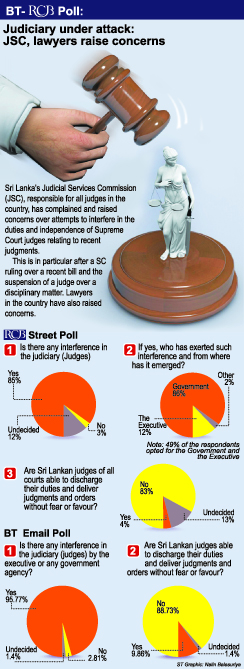Crisis in governance
View(s):If former Securities and Exchange Commission (SEC)Chairman Thilak Karunaratne was frank and forthright on what ails Colombo’s stock market, then respected banker Ranjit Fernando was even, more blunt.
“There is a pattern in the country where dissent is opposed and there is no (room for) free discussion,” he told a rapt Colombo audience. Speaking at the panel discussion on ‘Development in the stock market’ at the Sunday Times Business Club meeting this week, Fernando was of the view that the governance issues at the SEC that has seen the appointment of four chairpersons in 2-3 years, was part of a malady affecting this country. “There is no free criticism of one another. We all love this country and what is said should be taken in that spirit. But that is not the case today,” the former CEO of the Natonal Development Bank, former Ministry Secretary and currently chairman of United Motors, said firmly. Karunaratne’s presentation was devastating. Loaded with facts and figures of the machinations and manipulations in the market, he said the SEC – during his time – was aiming to develop a well-regulated and healthy market.”Unfortunately even the surveillance mechanism was not working and investigations were slow. I was compelled to request the assistance of the Attorney General to assign a State Counsel to help us with this work,” he said, adding that he hoped the new management will take forward the gamut of activity that was started during his time. In a no-holds barred presentation, Karunaratne said that it was an insult to the SEC and pathetic to see the institution sending ‘conciliatory’ letters to investors who were required to send in information relating to trades; in a manner, he says, was like apologizing for sending the original letters in the first place. He also spoke on the need for an independent regulator citing the US model where the current chairperson of the securities regulator first joined as a full-time commissioner at 40 years appointed by then President Ronald Reagan, and then served under several republican and democratic presidents and at 64 years became the head of the institution appointed by incumbent President Barrack Obama. “That’s what real independence is. Here? What do you do when the President calls you one morning and says your time is up? Then you have to go,” he said. The underlying message that came out from both Karunaratne and Fernando was the need for absolute independence of the regulatory process in banking, finance and securities and no interference from any quarter. The issue of interference confronts the judiciary too with the Judicial Services Commission (JSC) raising its own concerns. This issue was the focus of a joint Business Times (BT)-Research Consultancy Bureau (RCB) poll, which drew a wide response. There were many who either emailed or called the newspaper saying as much as they would have liked to take part in the poll, they were reluctant to do so, fearing repercussions if their identity was known. While most middle class urban dwellers in and around Colombo have always expressed concern about good governance and transparency, the poll cum survey of workers and others on the street by the BT-RCB on the issue of independence of the judiciary drew the same concerns. The RCB poll conducted in a Nugegoda and Nawala saw the majority saying that there’s interference of the judiciary, it’s the government that is mostly exerting pressure and judges are not free to deliver judgments in a free and fair manner.
This majority view from the street poll is a reflection that Sri Lankan society believes in the rule of law and the judiciary as upholding these laws. The yardstick of any decent and disciplined society is the sustenance of a system guided by laws and principles of good behaviour, conduct and equality to all. Not like today’s governance which is based simply on the diktat “Might is right” and simply on the power of money and influence. More and more, professionals, intellectuals and simply hard working and decent people in society are becoming disillusioned on the way things are happening at all levels of public office.
The government may firmly say that there is no interference in the rule of law. However if there is even the slightest doubt, a perception that this is happening, then not only the authorities but the people too need to be concerned. Sri Lanka, as we have repeatedly pointed out, has a great opportunity to develop the country and leap-frog into the future in the post-war era, if not for greed and abuse of power standing in the way. The President told newspapers editors on Thursday that, as a lawyer and citizen, he stands for the independence of the judiciary. However the poll which is a representative view of Sri Lankans from all walks of life clearly shows the people don’t believe him.
Follow @timesonlinelk
comments powered by Disqus
















